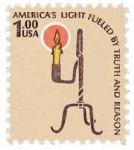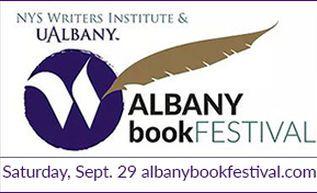 This event, put on by the wonderful New York State Writers Institute, was not really political. But nobody would read this if I just titled it “Albany Book Festival.” And in fact it says a lot about our times how politics did inevitably color these proceedings. There’s no escaping America’s current crisis of the soul.
This event, put on by the wonderful New York State Writers Institute, was not really political. But nobody would read this if I just titled it “Albany Book Festival.” And in fact it says a lot about our times how politics did inevitably color these proceedings. There’s no escaping America’s current crisis of the soul.
The kickoff was a reception installing Colson Whitehead as the New York State Author and Alicia Ostriker as State Poet. Both were introduced by former State Comptroller H. Carl McCall, who did an admirable job talking about their work.

As is customary for Writers Institute events, the munchies were superb: little cakes, a chocolate fudge & whipped cream confection, cookies, fruit, etc. (A thankyou to Paul Grondahl, the Institute’s dynamic leader.)
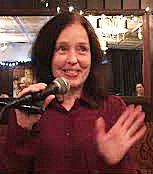
Broderick
A legion of local authors manned individual tables showcasing their work. Noteworthy among them was poet Therese L. Broderick, author of the acclaimed Breath Debt. (My wife.)
And a legion of other great literary luminaries spoke to packed audiences. Doris Kearns Goodwin is one of our leading historians, and talked about her new book, Leadership in Troubled Times. It focuses on the lessons from four presidencies: Lincoln, TR, FDR, and LBJ.

Goodwin
Goodwin’s theme was that character, above all, is what matters. She ticked off a list of key traits: humility, empathy, valuing diverse opinions, ability to connect with all manner of people, controlling negative impulses, and keeping one’s word. In sum, emotional intelligence. Goodwin’s rundown here elicited loud laughter from the audience, for the obvious reason that our current “leader” is so glaringly devoid of all these virtues.
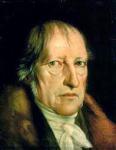
Hegel
I next listened to a panel of four other historians. One noteworthy discussion reminded me of Hegel’s concept of thesis and antithesis cycling to synthesis. The 1954 Brown v. Board of Education decision, ending legalized racial segregation, produced a big backlash among white southerners, resisting it, sometimes violently. But that in turn energized its own backlash, in the civil rights movement, eventual civil rights and voting rights legislation, and, one might say, the eventual election of an African-American as president. Which in turn generated another big backlash culminating in the election of a very different sort of president. Which in turn has energized civic engagement against what that represents (very much in evidence in the responses of attendees at this book festival).

SPOS
I don’t know that we’re near Hegel’s final synthesis. I’m hopeful that Trumpism is a doomed last gasp, and that America will flush its toilet for good in 2020. But experience with my own bathroom suggests a different outcome is possible.
Next I went to Marion Roach Smith’s talk on memoir writing. The room was not ideal; her husband, Times-Union editor Rex Smith, had to kneel by her side manning the computer with her power-point presentation, advancing the slides every time she signaled.

Smith
Though sometimes he misinterpreted her gesturing. But it was an excellent talk applicable not just to memoirists, but to writing in general. Her key theme: focus on what the piece of writing is really about; what its argument is. A memoir’s reader is not interested in the details of what may have occurred but, rather, in gaining some insight on a human issue.
William Kennedy is Albany’s leading literary light, who founded the Writers Institute, and recently turned 90. He’s a literary energizer bunny who just keeps going, premiering a new book at the festival.
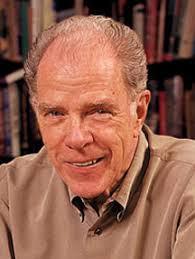
Kennedy
His talk was a meditation on writing and the writing life. I particularly relished his discussion of Faulkner, probably my own favorite. He adverted to the idea that Faulkner’s work is uplifting. “This uplift business baffled me,” Kennedy said. Faulkner certainly depicts the worst human behavior. Yet Kennedy said he was uplifted after all, “exalted,” by writing that reaches into a person’s heart. (I have written about Faulkner on this blog, with a somewhat similar take. In fact, it was a Faulkner quote I used as the epigraph for my Rational Optimism book.)
The final event was a panel titled “The New Americans” — a group of authors born elsewhere. Again, a theme with particular resonance in today’s political environment.

Iftin
One panelist was Abdi Nor Iftin, who I got to meet and chat with at the previous night’s reception. He was the Somali guy whose tribulations getting to America were told on NPR’s This American Life. Hearing that story so moved me that I wrote a poem (previously posted here), and sent him something. He now has a book out, Call Me American. What a thrill it was for me to connect with Abdi in person.
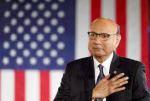
Khan
Another panelist was Khizr Khan, whom I’ve also written about (here, and here). It was likewise a thrill to shake his hand and tell him what a privilege that was. Khan continues to remind us how our Declaration of Independence and Constitution enshrine human dignity. He said no other country’s constitution rivals ours in that regard — and that he’s actually read them all! He also said that in over 200 appearances, in connection with his book, he has everywhere found Americans wanting to hold onto these values, and hopeful not only for America but for America as “a source of light” for the rest of the world.
